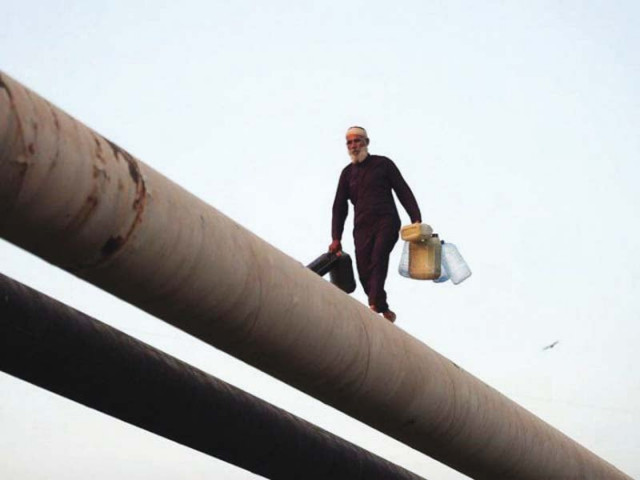From Sheikhupura-Peshawar: Fate of white oil pipeline project unclear
New govt to decide whether it is feasible to go ahead with the project

The K-IV project is expected to provide an additional 260MGD water to Karachi. PHOTO: FILE
Earlier, the federal government gave the go-ahead to ISGS - a state-owned company set up to handle gas import projects - for laying the white oil pipeline between Sheikhupura and Peshawar.
ISGS then invited tenders from companies for building the pipeline, estimated to cost Rs56 billion, with the intention of tackling oil theft and breaking monopoly of oil tanker owners who time and again threaten to stop oil transportation across the country. Feasibility study of the pipeline project has already been conducted.
However, the Oil and Gas Regulatory Authority (Ogra) ignored ISGS and even did not conduct public hearing for that pipeline project.
It, however, approved the grant of licence to Frontier Oil Company, a subsidiary of Frontier Works Organisation (FWO), for constructing an oil pipeline on the same route. Ogra’s decision left the ISGS project economically unfeasible. Sources revealed that the ISGS board met recently and discussed the fate of the white oil pipeline. It argued that two oil pipelines were not required on the same route because of limited demand for oil consumption in targeted areas.
It passed a resolution to put the case before the new government of Pakistan Tehreek-e-Insaf (PTI).
The previous government of Pakistan Muslim League-Nawaz (PML-N) had decided that the laying of all future oil pipelines would need the nod of the federal cabinet - a decision which would prevent the FWO from undertaking the pipeline project. FWO is an independent engineering company and the government’s policy only allows state-run companies to lay oil pipelines.
Earlier, Ogra held a public hearing in Peshawar for the grant of licence to the FWO for constructing an oil pipeline from Lahore to Peshawar. On the occasion, the Khyber-Pakhtunkhwa government, led by the PTI, supported the FWO, instead of ISGS.
Afterwards, the Economic Coordination Committee (ECC) of the cabinet decided, in a meeting held on April 17, that proposals for all future oil pipelines should be sent to the federal cabinet for consideration and approval, suggesting the FWO would have to first go to the government with its project plan.
During the hearing, the FWO emphasised that it wanted to lay the oil pipeline from Machike to Tarujabba at an estimated cost of $370 million, which the K-P government described as cheap. However, a senior government official told The Express Tribune that the ECC had approved the project at a cost of $280 million, which was $90 million less than the cost estimated by the FWO.
The ECC was told that the quoted composite tariff was about 60% lower in comparison to the present trucking rate. It would lead to savings of Rs100 billion for the exchequer during the entire build, operate, own and transfer (BOOT) period and would bring the cost down for oil consumers.
Furthermore, as per BOOT contract, pipeline assets would be transferred to a nominated enterprise after 15 years at a price of one-rupee only. Resultantly, the tariff will be negligible because only the operating cost would have to be recovered. During the meeting, then prime minister Shahid Khaqan Abbasi noted that transportation of petroleum products through oil tankers was expensive compared to the pipeline. Moreover, he said, oil supply through the pipeline was safe and environment-friendly and a lot of time would be saved as issues like clogged roads would not crop up.
It was pointed out that some oil tankers had met fatal accidents that caused hundreds of human causalities, adding the proposed pipeline would provide a safe and efficient way for the supply of petroleum products. The ECC was told that government funds would not be required for executing the project.
Oil tanker owners have been calling strikes in the past to stop oil supply across the country which has been a matter of grave concern for the government. They have also been allegedly involved in oil theft at different depots of Pakistan State Oil (PSO) and power plants.
In order to ensure a smooth supply of oil and avoid theft, the Petroleum Division has planned to lay the oil pipeline and assigned the task to ISGS to work as a designated company for floating tenders.
Published in The Express Tribune, August 22nd, 2018.
Like Business on Facebook, follow @TribuneBiz on Twitter to stay informed and join in the conversation.



















COMMENTS
Comments are moderated and generally will be posted if they are on-topic and not abusive.
For more information, please see our Comments FAQ